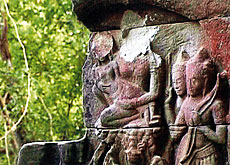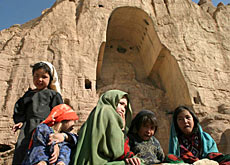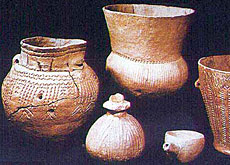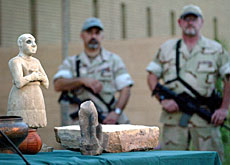Souvenir hunters warned off illegal purchases

The Swiss non-governmental organisation, the Berne Declaration, has reminded tourists heading abroad this summer to think twice about bringing back souvenirs.
The warning comes ahead of the introduction of new legislation tightening the rules on imports and sales of cultural goods.
The NGO says many travellers fail to realise that “souvenirs”, especially in developing nations, are often objects stripped from historical sites, stolen from tombs or from their legitimate owners.
“A country’s heritage is not a renewable resource,” said Claudia Buess of the Berne Declaration. “Moving it to another country has effects on cultural awareness and identity.”
“That’s why travellers need to realise exactly what they are buying in Africa, Asia or Latin America,” Buess told swissinfo.
Economic impact
Francesca Gemnetti, president of the Swiss Unesco commission, agrees that travellers need to be better informed.
“Tourists are often tempted to bring home something that has been stolen, and this kind of behaviour encourages trafficking,” she told swissinfo.
But Gemnetti says the situation is improving, and the problem is not as widespread as it has been in the past.
“Tourists, especially the Swiss, are more ecologically aware and have greater respect for other cultures,” she added
The Berne Declaration has published a brochure giving instructions to tourists on what to consider when making a purchase abroad.
It suggests travellers should always ask about the origin of an object and find out who the previous owner was.
They should also check if export restrictions apply. In Mali, for example, terra cotta figurines cannot leave the country.
Besides irreversibly damaging a country’s culture and traditions, illegal exports of works of art also have an economic impact.
“Countries that can display their cultural goods attract revenue,” Buess told swissinfo. “Tourists will make the trip if they are interested in seeing something, like Machu Picchu in Peru or Angkor Wat in Cambodia.”
Governments also stand to make money from loaning out their collections, according to Buess.
“The Tutankhamun exhibition in Basel has earned the Egyptian authorities SFr5 million ($4.1 million),” she said.
Art trafficking
Because of its earlier reluctance to tighten the law on the transfer of cultural goods, Switzerland had earned a reputation as a transit point for stolen works of art.
But parliament decided last year that Switzerland would no longer be a safe haven for art traffickers, bringing legislation into line with the 1970 Unesco Convention against cultural goods trafficking.
Under the new law, tourists will have to provide documentation proving the origin of works of art and show sales receipts to customs officers.
But the Berne Declaration says the legislation, which comes into force next spring, will not suffice on its own.
“People also need to change their attitude,” said Buess.
According to the Federal Culture Office, Switzerland is among the art world’s five biggest trade hubs.
Internationally, stolen works of art make up the third-biggest illegal market behind drugs and the arms trade, according to Unesco and Interpol.
swissinfo, Scott Capper
Around 70 per cent of Mali’s archeological sites are estimated to have been looted.
In China, 20,000 tombs are looted each year.
According to the International Council of Museums, 255 works of art have been stolen from Guatemala’s churches and monasteries, and just 29 returned.
The Berne Declaration was created in 1968 after Protestant theologians demanded more aid for developing nations.
An association since 1971, the NGO aims to get the governement and companies to change their attitude towards these nations.
The Berne Declaration is financed by sales of its magazine and membership fees.

In compliance with the JTI standards
More: SWI swissinfo.ch certified by the Journalism Trust Initiative












You can find an overview of ongoing debates with our journalists here . Please join us!
If you want to start a conversation about a topic raised in this article or want to report factual errors, email us at english@swissinfo.ch.